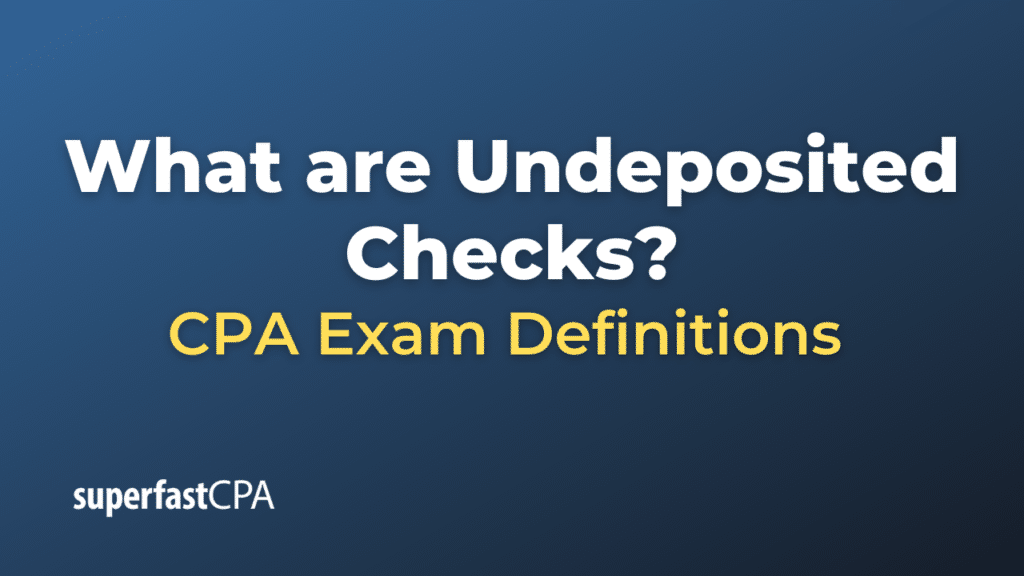Undeposited Checks
Undeposited checks are checks that a business has received but has not yet deposited into its bank account. These checks are essentially inflows of revenue or other forms of payment that are recorded on the company’s books but are not yet reflected in the bank statement. Undeposited checks often appear as a line item in a company’s accounting records to indicate that the funds are in transit and have not yet been credited to the company’s bank account.
Key Points:
- Accounting Entry: When a business receives a check, it often records a debit to Accounts Receivable (if it’s a payment for an outstanding invoice) or another appropriate account, and a credit to the Undeposited Checks account or Undeposited Funds account.
- Bank Reconciliation: The Undeposited Checks account helps in the bank reconciliation process, as it accounts for checks that are not yet reflected in the bank statement.
- Cash Management: Monitoring undeposited checks is crucial for cash management, as these funds are not available for use by the business until they are deposited and cleared.
- Risk : Holding onto checks for an extended period could be risky, as it increases the chances of checks being lost, stolen, or becoming stale-dated (too old to be cashed).
- Financial Reporting: The amount in the Undeposited Checks account should be properly reported in the company’s balance sheet under current assets, as it represents cash that is expected to be received shortly.
Example of Undeposited Checks
Let’s walk through an example to understand how “Undeposited Checks” are managed in a business accounting scenario. We’ll use a fictional small business, “Joe’s Cafe,” for this example.
Scenario:
Joe’s Cafe has received three checks from customers during the week:
- Check 1: $500 from Customer A
- Check 2: $300 from Customer B
- Check 3: $200 from Customer C
These checks have been received but have not been deposited into the bank account yet. They are placed in a safe or another secure location until they can be deposited.
Accounting Entries:
Upon Receiving Checks:
When the checks are received, Joe’s Cafe will make the following accounting entry to acknowledge receipt of these payments:
- Debit Accounts Receivable: $1,000 (Sum of all checks)
- Credit Undeposited Checks: $1,000
This entry acknowledges that Joe’s Cafe has received payments totaling $1,000, but this money has not been deposited into the bank yet.
Upon Depositing the Checks:
Once Joe deposits these checks into the bank, and they clear, another accounting entry will be made:
- Debit Bank Account: $1,000
- Credit Undeposited Checks: $1,000
This entry zeroes out the Undeposited Checks account and acknowledges that the money is now in the bank account.
Bank Reconciliation:
At the end of the month, when Joe’s Cafe performs bank reconciliation, the undeposited checks would play a crucial role. If the checks have not yet cleared, the Undeposited Checks account would help explain why there’s a discrepancy between the bank statement and the company’s internal accounting records.
Importance:
- Cash Management: By keeping track of undeposited checks, Joe’s Cafe can better manage its cash flow and understand how much money is actually available for use.
- Financial Reporting: Accurate recording of undeposited checks ensures that the financial statements reflect the true financial position of the business.
- Risk Mitigation : Prompt deposit of checks minimizes the risk of loss, theft, or checks becoming stale-dated.
Understanding the concept of undeposited checks and managing them effectively is crucial for any business, large or small, for both accurate financial accounting and effective cash management.













